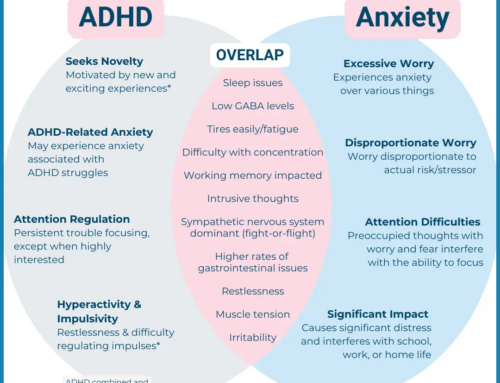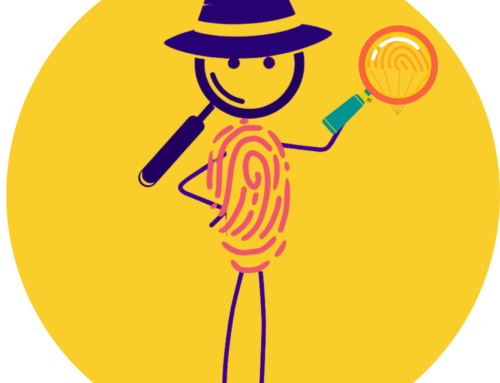Do or someone you love feel perpetually unworthy? Defective? Sorry? Shame haunts people of all ages with ADHD who feel trapped by self-blame. Learn about where it comes from, why it’s harmful, and how to improve emotional health for yourself and your loved ones.
Shame is one of the oldest known English words that originally meant, “to hide or cover up.” As such, shame’s destructive spiraling characteristics rely on its tendency to remain hidden, never addressed. Feeling shame is different than feeling guilt. Guilt focuses on what one has done. Shame focuses on who one is.
The ADHD brain is particularly vulnerable to this shame spiral. For many, it’s because even a minor mistake can trigger rejection sensitivity bringing along with it an isolating wall of shame, hopelessness, and depression.
Shame is characterized by a constant sense of inadequacy and agonizing feelings of embarrassment and humiliation. You may even feel like you’re developing a secret life – you’re so ashamed of who you are or what you’ve done that you’re certain you’ll never pass for “normal.” According to Edward Hallowell, M.D., ‘Shame is arguably the
most painful of all the symptoms associated with attention deficit disorder (ADHD or ADD). We carry it like a heavy anvil around our neck, telling ourselves, “I’m bad. I’m stupid. I’m just a loser.”’
.
We hide, we avoid, and we turn away from the thing that feels so bad- desperately turning to whatever is brightest, shiniest, and most absorbing. This works for a while, but eventually, we realize what we are doing, and the implications of hiding from that meeting, cancelling those plans, avoiding that paper, or skipping that quiz, start to seep in. This realization triggers a whole new set of negative feelings, and now our numbed-out distraction is invaded by feelings of shame once again- deepening the spiral and often sending us into even more absorbing distractions.
For people with ADHD, shame arises from the repeated failure to meet expectations from parents, teachers, friends, bosses, and the world. It is estimated that those with ADHD receive 20,000 corrective or negative messages by age 10. They view themselves as fundamentally different and flawed. They feel they are not like other people.
.
People with
ADHD who feel shame tend to withdraw into themselves – or hide behind a rage at the perceived source of the negativity. This may explain why people with ADHD fear letting others get to know them intimately or to see how they live. Individuals with ADHD harbor two horrible secrets: Their future is uncontrolled and uncontrollable, and life can inflict wounding shame just as easily as it engenders success.
.
Shame causes many people with ADHD to try to be perfect. A person thinks: “If I look and do everything perfectly, I can avoid shame.” A person with ADHD who holds this belief is constantly evaluating everyone in their lives – friends, family, children – to see what they approve of and value and gives it back to them. The person with ADHD forgets what she genuinely wants from her own life in the process of trying to be everything to everyone else.
Many people who feel shame stop trying to do things – at work and at home – unless they are assured in advance of quick, complete, and easy success. They do not have the ability to
sustain effort for long if they are not succeeding completely. This is often misinterpreted as laziness, leading the person to feel more shame and more misunderstood. This is one reason video games are so popular. If you fail, only you know. You reboot and move on, as if nothing happened.
.
Shame can lead to mood disorders, crippling anxiety, and in some cases, self-medication with drugs or alcohol – all of which can make it more difficult to solve problems and get out of the negative cycle. Shame can make you defensive, which can come across as anger – if you lash out at the people closest to you, you may push them away just when you need them most.
.
Shame gets in the way of asking for help – for both adults and kids with ADHD. For many people with ADHD, telling a doctor about their failures and asking to receive medication to help them succeed is unthinkable. They have tried everything, and it hasn’t worked. Many children would rather flunk than ask the teacher for help. This is why many parents feel blindsided when they discover how badly their child is doing in school. Their child didn’t tell them because it was so shameful to admit it.
In order to conquer ADHD shame, shift from a moral view to a detective’s lens. Instead of judging yourself as right or wrong, get curious. Start looking at your ADHD from a neurological perspective. ADHD is supported by real science – like MRIs and genetic studies – so don’t view it as a personal fault. Acknowledge that yes, you have difficulties based on certain symptoms, but your ADHD doesn’t have to be a weakness; it’s simply a matter of brain chemistry.
.
It’s your challenge to overcome, and it’s up to you to decide how to face it. Consider that Executive Function Skills can be learned, practiced, and developed, like learning to hit a baseball, draw a tree, or sing a song. Set goals that will make a difference and practice one small change at a time to get closer to achieving them.
Embrace the positives that go with your ADHD, not just the negatives. Whenever you feel shame raise its ugly head, take a second to take stock of your talents and strengths. ADHD is characterized by creativity, initiative, persistence, originality, and more. Learn to recognize these traits in yourself, even at moments when it seems impossible.
.
One powerful tool for adopting and maintaining this
strengths-based approach is the Quantum Jump student program, which combines the direct teaching of executive function skills and leadership principles with tools that help you develop your personal strengths, interests, motivation, and goals. The planning system you will learn in this program helps you measure and track success, leading you to develop a powerful sense of growth mindset.
To tackle the challenges of ADHD and avoid the unnecessary burden of shame, it is crucial to address behavioral issues at an early stage. By conducting early screenings, parents, caregivers, and children can gain a more objective understanding of their strengths and weaknesses in executive function skills, without perceiving them as personal flaws. Remember, an official diagnosis is not a prerequisite for children to benefit from EF Skills teaching and coaching. By utilizing a screening tool like
Quantum Jump, valuable strategies and interventions can be implemented, ultimately making the diagnosis process smoother and less daunting.
.
With early intervention, children can begin thinking about their executive function skills strengths and weaknesses and developing understanding of how, where, and when to use the different skills. The common language between parents, teachers, and students provides powerful tools for communicating shared goals and celebrating achievement. It takes away guesswork for “what is wrong” with a student’s behavior and focuses the team on forward-facing actions.
.
Another important part of early screening is the opportunity to avoid negative or corrective messages and focus instead on positive ways to reinforce desired behaviors. When a student better understands the reason for the mismatch between their intentions and their behaviors, they can maintain the positive self image that all children deserve to experience as they figure out their interests, strengths, and opportunities for growth. In addition, the self-belief that a student carries with them translates into empathy, kindness, and compassion for other students.
When dealing with ADHD, it is crucial to acknowledge and address the significant impact of shame that often accompanies this condition. This involves recognizing the real and painful characteristics of ADHD-related shame, both for individuals living with ADHD and for their loved ones. To effectively combat ADHD-related shame, several key strategies can be employed.
1. First and foremost, early diagnosis plays a vital role in understanding and managing the condition. By identifying ADHD early on, individuals and their support networks can access appropriate resources and interventions to address the challenges associated with ADHD. This can help alleviate the feelings of shame that may arise from not fully understanding or explaining certain behaviors.
2.Open communication is another essential aspect of combating ADHD-related shame. By fostering open and honest discussions about the condition, individuals can create a supportive environment where they feel safe to share their experiences and emotions. This open dialogue also allows loved ones to gain a deeper understanding of ADHD and its effects, fostering empathy and reducing any shame or stigma associated with the condition.
3.Accessing trusted resources is equally important when addressing shame related to ADHD. These resources can include educational materials, support groups, therapy services, and online communities. By seeking out reliable sources of information and support, individuals and their loved ones can gain knowledge, guidance, and validation, which can help challenge and overcome shame.
4.In addition to these strategies, adopting a strengths-based approach is key. This entails embracing both strengths and weaknesses associated with ADHD and recognizing that individuals with ADHD possess unique talents and abilities. By focusing on these strengths, individuals can build confidence and self-esteem, counteracting any shame that may arise from perceived shortcomings.
5.It’s also valuable to develop a mindset of setting goals and taking action. By defining a clear vision for oneself, establishing achievable goals, and actively working towards them, individuals can enhance self-awareness and cultivate a sense of purpose and fulfillment. This proactive approach helps individuals shift their focus away from feeling unfulfilled and empowers them to become unstoppable in their pursuit of personal growth and success. In summary, addressing the shame associated with ADHD requires a multi-faceted approach.
Early diagnosis, open communication, and accessing trusted resources are crucial components in shedding light on ADHD-related shame and building emotional well-being. Meanwhile, adopting a strengths-based approach, embracing both strengths and weaknesses, and actively pursuing personal goals can enhance self-awareness and confidence, guiding individuals from a place of feeling unfulfilled to becoming unstoppable.
Yours in the journey,
Cara
Post Views: 681







